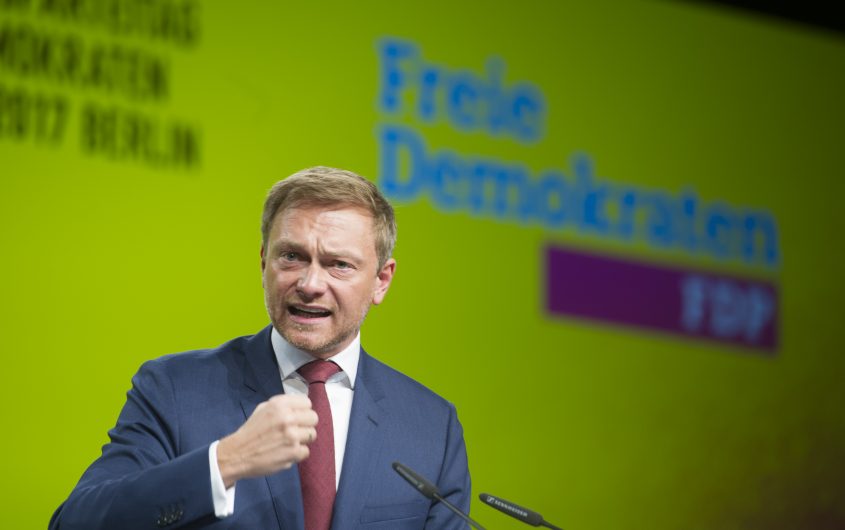
Steffi Loos/Getty Images
The FDP: The Resurrection?

Jackson Janes
President Emeritus of AGI
Jackson Janes is the President Emeritus of the American-German Institute in Washington, DC, where he has been affiliated since 1989.
Dr. Janes has been engaged in German-American affairs in numerous capacities over many years. He has studied and taught in German universities in Freiburg, Giessen and Tübingen. He was the Director of the German-American Institute in Tübingen (1977-1980) and then directed the European office of The German Marshall Fund of the United States in Bonn (1980-1985). Before joining AICGS, he served as Director of Program Development at the University Center for International Studies at the University of Pittsburgh (1986-1988). He was also Chair of the German Speaking Areas in Europe Program at the Foreign Service Institute in Washington, DC, from 1999-2000 and is Honorary President of the International Association for the Study of German Politics .
Dr. Janes is a member of the Council on Foreign Relations, the International Institute for Strategic Studies, the Atlantic Council of the United States, and American Purpose. He serves on the advisory boards of the Berlin office of the American Jewish Committee, and the Beirat der Zeitschrift für Außen- und Sicherheitspolitik (ZfAS). He serves on the Selection Committee for the Bundeskanzler Fellowships for the Alexander von Humboldt Foundation.
Dr. Janes has lectured throughout Europe and the United States and has published extensively on issues dealing with Germany, German-American relations, and transatlantic affairs. In addition to regular commentary given to European and American news radio, he has appeared on CBS, CNN, C-SPAN, PBS, CBC, and is a frequent commentator on German television. Dr. Janes is listed in Who’s Who in America and Who’s Who in Education.
In 2005, Dr. Janes was awarded the Officer’s Cross of the Order of Merit of the Federal Republic of Germany, Germany’s highest civilian award.
Education:
Ph.D., International Relations, Claremont Graduate School, Claremont, California
M.A., Divinity School, University of Chicago
B.A., Sociology, Colgate University
Expertise:
Transatlantic relations, German-American relations, domestic German politics, German-EU relations, transatlantic affairs.
__
Will the FDP be returning to the stage of national government after the German elections next month? Maybe. Current polls suggest the Free Democratic Party (FDP) could be the coalition partner to a reelected Chancellor Merkel and the CDU/CSU, resuming a role that it played for decades. The question is whether the FDP can pull it off again after four years in exile.
But first, the party must answer a larger question: Why should Germans vote for the FDP?
While traditionally the party has stood for small government and low taxes, Christian Lindner, the 39-year-old leader of the FDP, is working to transform its image into a more modernized version, pushing investment in the digital sector (in which he worked). Projecting the party as more than just a facilitator for a coalition, his campaign slogan “Denken wir neu” is a call to think in new ways about the future. The challenge is to get enough voters—beyond its traditional middle class and self-employed base—to think in new ways about the FDP in an era in which more parties and more issues have emerged in the political scrum.
Today, the problems the FDP faces are generational as well as programmatic. For almost half a century, the FDP secured top ministerial positions in the national governments with well-known leaders, such as Hans-Dietrich Genscher as foreign minister or Otto Graf Lambsdorff as economics minister. In 2017, the FDP doesn’t have many nationally-known personalities. It is still in a rebuilding phase, with Lindner as the main messenger of the party, and several figures in state and EU leadership who could make the transition to Berlin—Katja Suding in Hamburg, Andreas Pinkwart in North Rhine-Westphalia, Wolfgang Kubicki in Schleswig-Holstein, or Alexander Graf Lambsdorff in the European Parliament, among others.
Programmatically, the FDP has been part of a coalition government in only four of the last nineteen years. It was out of government from 1998 to 2009, and in a governing coalition with the CDU/CSU from 2009-2013 until its crushing defeat and exit from the parliament —the first time it was not represented since 1949.
Now Lindner is trying to resuscitate the defeated image of the party with tough stances on euro and finance issues, immigration policies, and support for Europe. Lower tax rates, a more flexible labor market, and a belief in open and free markets at home and in the global arena are part of the platform.
While that might fit into a CDU/CSU coalition, the question is whether the party would have greater weight than the last time around with Chancellor Merkel—a time when, despite having secured key positions such as the Foreign Office, it didn’t result in a clear picture of the party’s influence in Berlin. This will be especially important if Merkel is reelected to a fourth term with a strong mandate.
There is also talk of a possible coalition with both the FDP and the Greens with the CDU/CSU. That could further threaten the influence of the FDP in the battle over posts within a coalition government.
Yet another possible coalition exists: one with another former partner, the Social Democrats (SPD). It would likely require a three-way coalition with the Greens to reach a majority, but that seems out of reach given the SPD’s current standing in the polls (22%).
Christian Lindner had inherited this legacy as he seeks to achieve a strong finish for the FDP on September 24. Should he fail, the party will face another major existential crisis. If he secures enough support to form a majority government, he will be able to write a new chapter for the Free Democratic Party. Yet even if the result is only that the party is back in the Bundestag but in opposition rows, it will still be an accomplishment and an opportunity to shape a new generation of leaders as well as a new party. Either way, that will truly require—as the slogan proclaims—“Denken wir neu.”








